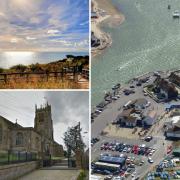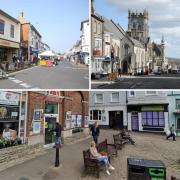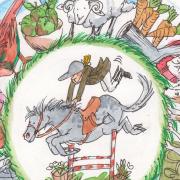Susanne Masters discovers a town which is reconnecting with its community and nurturing local networks
Arriving in Shaftesbury on a rainy day I had a very warm welcome from the people involved in Transition Town Shaftesbury. The Transition Movement, which developed as a response to peak oil production, uses a proactive approach to engage with alternatives to dependence on oil and to address global issues at a local level. In a nutshell, the transition idea rebuilds local resilience and self-sufficiency by setting up local networks and reducing carbon emissions and the reliance on oil. In many ways it is turning back the clock to a time when towns and villages had their own infrastructure, so they were self-supporting. For example, the local baker, miller and farmer combined to produce your daily bread, and market gardens supplied fruit and veg within a few miles of a town. Local resilience was used to great effect during the Second World War when we grew as much of our own food as we could. Apply this concept today, where fossil fuel prices are rocketing and food supplies worldwide are increasingly volatile, and it makes complete sense.By their very nature Transition Towns are based not on the actions of one individual but on a combination of local groups, so each town develops differently according to its community’s needs. In Shaftesbury current activities include a thought-provoking eco-circus spreading the word about the movement, a community farm project and a transition tree initiative, as well as local groups nurturing sustainable development. Robin Walter, Chairman of Transition Town Shaftesbury Committee, is very clear that the driving force behind the movement must come from the town. “What happens very much depends on seeing what is already in the community and supporting development of existing projects or, if there is a gap in services, developing something to meet those needs.” Part of that process is developing awareness of issues and opportunities through local meetings. Robin cites an example of a community lunch held last October that brought together a diverse mixture of individuals over baked potatoes from the Shaftesbury Home Grown project. Participants, including faith groups, the council and businesses, were invited to talk about a sustainable Shaftesbury and fostering connections. For example, the council said it was looking at developing cycle paths and the NHS project ‘Hope 2 Cycle’ was reconditioning bikes, so cycling is being supported as a means of local transport.
Trees for Transition In Robin Walter, Shaftesbury has a resident tree expert who has worked in both commercial forestry and conservation. Robin is currently involved with the community tree-planting schemes that have taken place around Shaftesbury, both on the community farm and also in public areas, where the fruit can be picked by anyone. “Trees can be a tool in finding sustainable ways to sequester more carbon than you emit,” he says. “They are also an important component of agroforestry systems, for example managing nitrogen/ammonia nutrient cycles which are as significant as carbon management.” On his website Trees for Transition, Robin combines his expertise with transition knowledge and suggests a range of roles trees can have that landowners and community groups could consider. Spreading the Word Getting the word out into the community about the benefits of a transition town is crucial. With this in mind, composer Karen Wimhurst, in collaboration with writer Dr Amanda Boulter, artist Peter Rush, director Paul Jordan and producer Julia Markus have developed an ‘Eco-Circus’. Their show A Tipping Point is an engaging way to explore issues, bringing them to a broad family audience. The performance is preceded by a circus skills workshop and, if funding can be found, A Tipping Point will be performed at the Big Green Fortnight in Poole. The Community Farm Shaftesbury Home Grown is a recently established community farm. With a sloping south-facing aspect, the site has beautiful views as well as great growing conditions. Heather Crump is a regular volunteer at the community farm and has found that the project is a slow but steady grower with the local community. “There has been a certain amount of apathy because it is easy to get in the car and go to the supermarket, but the farm is not just about growing food, it has a nice spirit; for example, we hosted a community lunch here last summer.” A small core group of hardy volunteers work on the farm Friday and Sunday mornings, carrying out garden tasks and selling produce. Last year the farm produced 27 varieties of fruit and vegetables. The vegetable beds are protected from badgers by an electric fence that uses photovoltaic energy to supplement the batteries. The soil is on a green sand bed, so is easy to work but needs fertilising. Fortunately, the site combines animal husbandry with fruit and vegetable growing. This is a classic combination which provides environmentally friendly fertiliser in the form of manure rather than expensive oil-derived fertilisers. But having animals on site isn’t problem free. David Godden, another volunteer, told me that the sheep grazing under the apple trees had eaten all the labels. “We’ll be relabelling the trees, out of the sheep’s reach, so we can see what they are!” he laughs. The farm also has pigs and free-range chickens. Up for future discussion is setting up a local garden share scheme, a bee share and a chicken share. So sharing in the good life for Shaftesbury’s residents is certainly part of this transition town’s dream.
Are you part of a transition initiative? E-mail helen.stiles@archant.co.uk
What is the Transition Movement?The Transition Movement “aims to help ordinary people reconnect to their local communities, re-energise their local economies and change their lives for the better.” Started in 2006, it has spread to 31 countries and there are now over 352 official Transition Initiatives ranging from streets and villages to cities. In the Westcountry these include Bristol, Exeter and Bath, and there’s even a Transition island – the Isle of Wight. Transition towns in Dorset include Wimborne, Blandford Forum, Bridport, Sturminster Newton, Sherborne, Weymouth and Portland, Dorchester, Poole, Christchurch and Bournemouth, which is also a hub for transition initiatives in south-east Dorset. At the other end of the scale is Thorncombe, a transition village, though perhaps the most famous transition village of all is Ambridge on BBC Radio 4’s The Archers.
Useful Contacts The Transition Network supports the Transition Towns Movement and helps train communities as they self-organise around the transition model. 05601 531882, transitionnetwork.org
Transition Town Shaftesbury, transitiontownshaftesbury.org.ukShaftesbury Home Grown Volunteer work days and produce for sale Fridays and Sundays 10am-1pm, and Tuesday evenings in summer, shaftesburyhomegrown.org.ukHope 2 CycleHope Office, Unit 6, Plot 25c, Longmead Industrial Estate, Shaftesbury. 01747 851397, hope2cycle.org.uk
Trees for Transition, 01747 850978, trees-for-transition.co.uk
Eco-circus – A Tipping Point, 01747 850878, ecocentrics.co.uk
Big Green Fortnight Bournemouth and Poole, 20 May to 5 June, bournemouth2026.org.uk/bgf
























